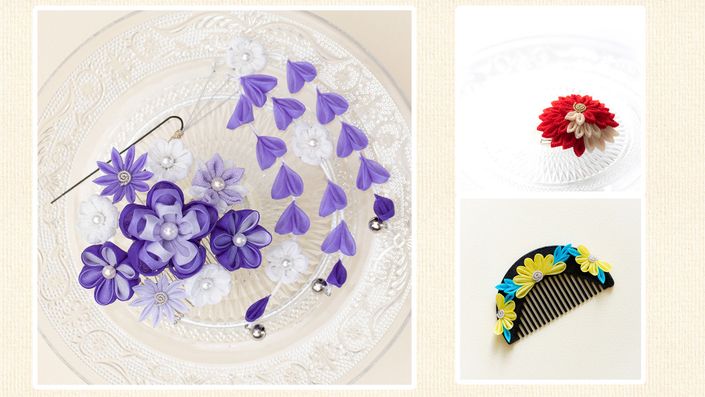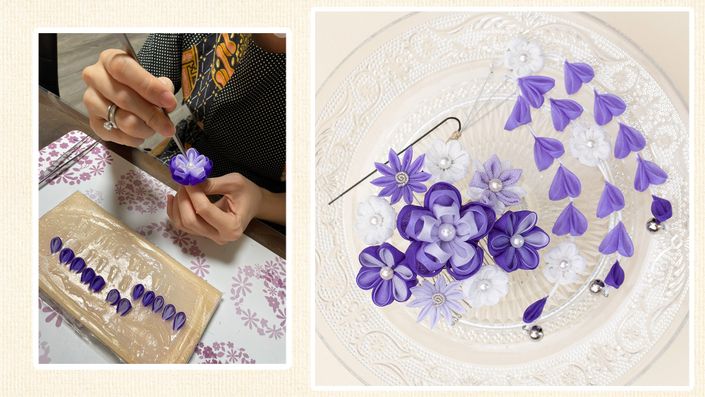Complete guide to learning the basics of the traditional technique of the craftsmen.
Traditional Craftsmen Style Method
- About and how to use tools and materials
- How to knead starch glue
- Basic techniques of tsumami zaiku
- Practical use of 2 basic techniques
- How to make a basic tsumami kanzashi (Japanese traditional hair ornament).
Goal for this course:
Master the very basics of traditional tsumami zaiku.
Master the technique to make a basic tsumami kanzashi.

Easy-to-follow videos will lead you into the world of tsumami zaiku!
Lesson1
Maru-tsumami flowers wall decoration
In this lesson, you will be learning how to use the tools of traditional tsumami zaku, 2 basic techniques by making a cute maru tsumami flowers wall hanging decoration
Lesson2
Kentsukiki ume clip brooch
In this lesson, you will be learning three techniques by making ken tsumami clip brooch. Different version of maru tsumami, a combination of maru tsumami and ken tsumami called, “kentsuki ume”, and “sagari”. This will be the first stage of making a tsumami kanzashi.
Lesson3
Shichigosan" kanzashi flower making
From this lesson, you will be learning how to make a small kanzashi (traditional hair ornament) for a girl to wear at the Shichigosan, an event to wish for the growth of a child. Since this kanzashi making will be a big project, it is formed into 2 lessons. In this lesson, you will be making “ochirin” (flowers etc. for kanzashi) and sagari.
Lesson4
Assembling "Shichigosan" kanzashi flower
In this lesson, you will be learning how to assemble the kanzashi for Shichigosan by using untwisted thread in traditional way.
You will also learn new words, “kumade” and
“bira” which will be indispensable for assembling traditional style kanzashi.

1on1 Zoom Session
After completing all the assignments, you will get a review from an English-speaking instructor in the zoom session.
For the reservation, contact
Course Materials Available!
You can choose to have materials for the lessons included or not!
You can make authentic Tsumami-zaiku with materials used by Japanese craftsmen if you choose to get a set of materials.
*Fabric color in the materials may be different from tutorial videos due to variations between lots.
Materials will be shipped via Japan Post.
*Due to Covid 19 and the war, in some countries, the shipping of materials has been stopped.
Please contact info_ita@tsumami-kanzashi.com before your enrollment.


Our Professional Tools Available
Tweezers (straight and thin),
Japanese Cypress wood board,
bamboo spatula,
and the starch glue.

Basic Course Feedback From Students
◆From the USA
The videos were well created and very easy to follow. It was especially easy to watch the instructor close up to see each movement and to copy each movement. I enjoyed the introduction to each lesson with information about the culture and history of Japan. The length of each video and the pace of each video is very good. I would watch each video once before starting the lesson. I would then start the lesson and pause the video as needed. The review tips at the end of each lesson were very helpful.
◆From France
The step-by-step videos are well divided: that way, even beginners who never did Tsumami Zaiku are able to get started; - The Course Texts were very valuable in my opinion! Making Tsumami Zaiku is nice, but getting to know about Japanese History related to it is even better!
◆From the USA
This course covered everything that a beginner student would need to know to get started in tsumami zaiku.
How to work with the glue, properly hold tools and fold fabric (right and left handed techniques) was covered in great detail with easy to follow videos.
It is a great course for those who want to learn more about tsumami zaiku as well as more experienced artists that are hoping to improve their work.
Students that complete this course will be able to make beautiful kanzashi.
Basic Course Trailer
The curriculum of Each Lesson
~No limited viewing time periods~
- Course Text
- Technical terms and related vocabulary for tsumami zaiku
- 1. Outline (2:47)
- 2. Tsumami-zaiku Tools (1:41)
- 3. Lesson1 Materials (1:20)
- 4. How To Use A Starch Glue (7:45)
- 5. Prepare The Bases (1:09)
- 6. How To Hold A Tweezers (0:49)
- 7. How To Make A ”Maru-oshi-tsumami” (16:52)
- 8. How To Make A Ken-tsumami (4:32)
- 8-1. How to make Ken tsumami_forLeftHanded (4:16)
- 9. Finishing The Work (3:02)
- 10. Review Points For Lesson 1 (4:04)
- Course Text
- Sagari Sheet for Basic Course Lesson2
- 1. Lesson 2 Outline (1:07)
- 2. Tools And Materials (1:55)
- 3. Prepare the base (3:22)
- 4. Prepare To Make A "sagari" (1:04)
- 5. How To Make A Flower Core (0:57)
- 6. How To Make A Ken-tsumami Sagari (6:23)
- 7. How To Make A "Kentsuki-ume" Flower (8:09)
- 8. Finishing The Work (4:43)
- 9. Review Points For Lesson 2 (2:09)
- Course Text
- Sagari Sheet for Basic Course Lesson3
- 1. Lesson 3 Outline (1:33)
- 2. Tools And Materials (1:30)
- 3. How To Make A Wired Base (1:49)
- 4. How To Make A Butterfly Antennae (3:52)
- 5. How To Make A "Dan-ume" Flower (7:39)
- 6-1. Making Maru-oshi Tsumami Flowers ~Making Petals~ (8:45)
- 6-2 Making Maru-oshi Tsumami Flowers ~Making Flowers~ (11:21)
- 7. How To Make A Butterfly (3:42)
- 8. How To Make A Ken-tsumami Leaves (5:49)
- 9. How To Make A Maru Tsumami Sagari (4:44)
- 10. Review Points For This Lesson (1:47)
- Course Text
- 1. Lesson 4 Outline (1:05)
- 2. Tools And Materials For Small Kanzashi (1:24)
- 3. How To Assemble A Small Kanzashi (9:35)
- 4. Tools And Materials For A Large Kanzashi (0:44)
- 5. How To Assemble A Large Kanzashi (10:10)
- 6. How To Finish The Sagari (9:10)
- 7. Tips For Handling The Kanzashi Thread (1:13)
- 8. Review Points For Lesson4 (3:10)
Basic Course Feedback From Students2
◆From France
The Course Texts were valuable informations in my opinion, because it really was something new to learn for me. It is nice to learn the techniques, but the Japanese History part is also very interesting.
◆From HongKong
The technique of making Maru-tsumami and Ken-tsumami; also the history and the meaning of colours are very useful to understand

Let's make beautiful tsumami zaiku together!
Welcome! I'm Tomomi Yamashita,
ITA Representative Director and Instructor
Hello! I'm Rei Furuya,
Traditional Tsumami zaiku Artist and Instructorproduct
Your Next Course
After taking the Basic Course, we recommend you to take Middle Course to learn further more!
Join the ITA Membership to earn benefits!!



